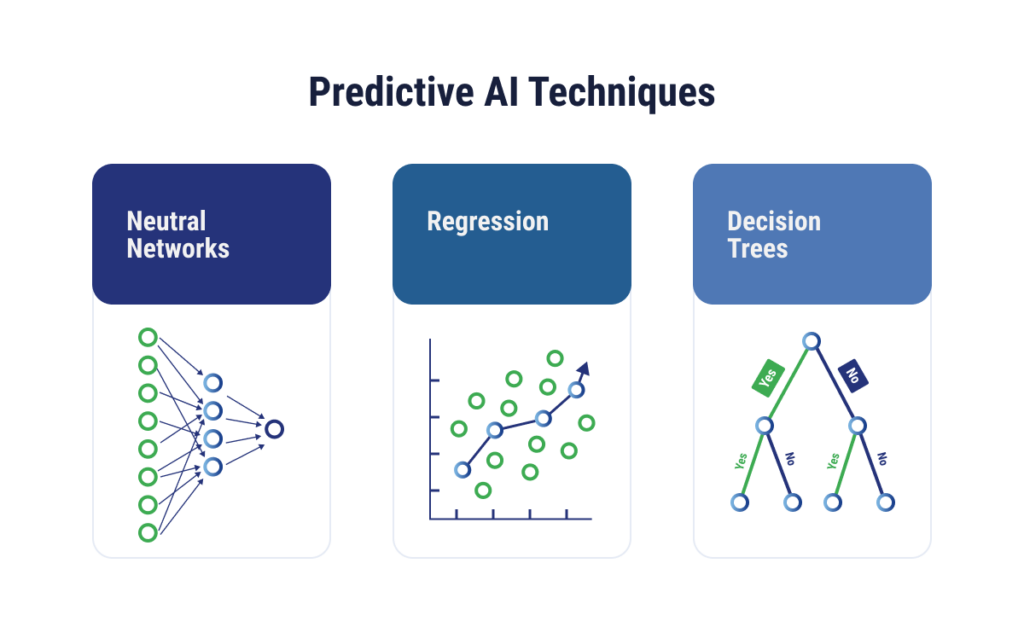As a tech entrepreneur, I'm convinced that 2025 will mark a major turning point in the adoption of predictive AI technologies by businesses. This technological advance will enable organisations to better understand their customers, anticipate their needs, and optimise their internal processes to remain competitive in an increasingly dynamic market.
But what is predictive AI? And how can it transform your business?

Predictive artificial intelligence?
Predictive artificial intelligence is a branch of AI that uses machine learning algorithms to analyse vast quantities of historical data and predict future events with great accuracy. These models can identify hidden trends, recurring patterns of behaviour, and even anomalies that would not be detectable using traditional methods.
In a business context, this means that you can use this technology to :
- Anticipating customer needs Understanding what your customers want before they even know what they want.
- Optimise your internal processes Reduce costs, improve operational efficiency and maximise revenues through accurate predictions.
- Making informed strategic decisions Use insights based on solid data to guide your sales strategy.
Anticipating customer needs using predictive AI
1. Advanced customisation
With thePredictive AIThis makes it possible to personalise the customer experience to an unprecedented degree. For example :
- An e-commerce platform can recommend products based on past purchases, searches carried out and even similar behaviour observed among other customers.
- A banking service can propose personalised offers (loans, investments, etc.) by analysing the customer's financial habits and anticipating future needs.
2. Predicting customer behaviour
Companies can now accurately predict whether a customer is likely to unsubscribe or change supplier. This means that proactive measures can be taken to retain these customers:
- Offer targeted promotions.
- Improve customer service to meet their unspoken expectations.
3. Proactive inventory management
By analysing consumer trends, companies can adjust their stock management to meet fluctuations in demand. For example:
- A clothing shop can anticipate which sizes or colours will be popular in a given season.
- A fast-food chain can adjust its supplies according to local food preferences.

Optimise your internal processes with predictive AI
1. Predictive maintenance
One of the most promising applications of predictive AI is predictive maintenance. By analysing data from IoT (Internet of Things) sensors, companies can predict when equipment is likely to break down and intervene before a problem occurs. This makes it possible to:
- Reduce unexpected downtime.
- Extending machine life.
- Reduce maintenance costs.
2. Optimising human resources
Predictive AI can also help HR make better decisions:
- Identify key talent likely to leave the company and set up retention programmes.
- Forecast recruitment needs based on economic and sectoral trends.
- Improve resource allocation by aligning employee skills with priority projects.
3. Intelligent process automation
In addition to traditional automation, predictive AI can be used to automate complex tasks by taking account of specific contexts. For example:
- An order management system can automatically adjust delivery times according to weather conditions or delays in the supply chain.
- A marketing tool can optimise advertising campaigns in real time based on the performance of the channels used.
Challenges and opportunities
While predictive AI offers incredible opportunities, its adoption is not without its challenges. Here are some key points to consider:
1. Data quality
Predictive AI algorithms are highly dependent on the quality and quantity of the data available. It is essential to ensure that your systems collect relevant and reliable data.
2. Technical skills
Integrating predictive AI into your processes requires specialist skills. Invest in training your staff or work with external experts.
3. Ethics and confidentiality
Using personal data to make predictions raises important issues of confidentiality and ethics. Make sure you comply with current regulations and maintain your customers' trust.
4. Initial cost
Although predictive AI can generate significant savings in the long term, the initial investment can be significant. Evaluate the return on investment carefully before making a commitment.
Predictive artificial intelligence will no longer be a luxury reserved for large companies, but a necessity for any organisation wishing to remain competitive. Thanks to its ability to anticipate customer needs and optimise internal processes, it offers unique opportunities to innovate, reduce costs and increase revenues.
To take full advantage of this technology, start today to explore its potential and prepare your business for the digital future. Visit tomorrow's leaders are those who are taking the lead today!









